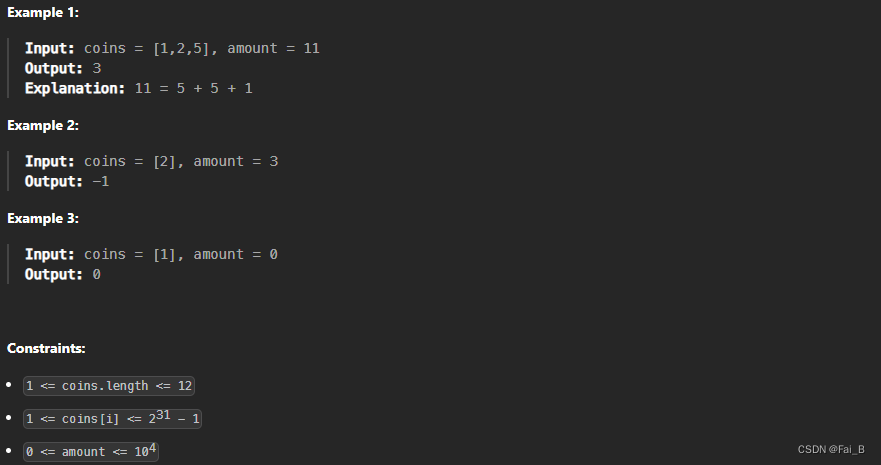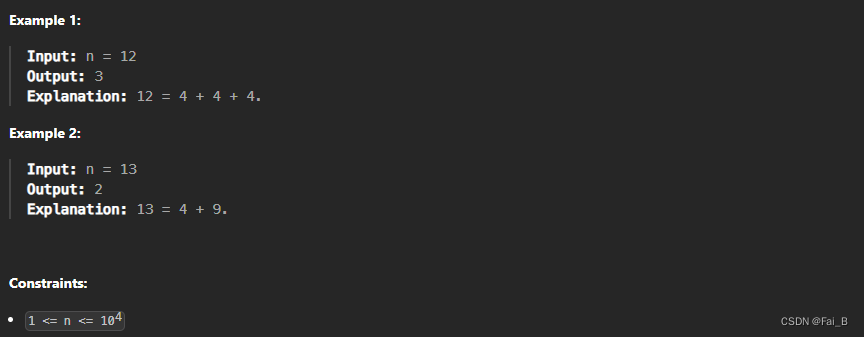You are given an integer array coins representing coins of different denominations and an integer amount representing a total amount of money.
Return the fewest number of coins that you need to make up that amount. If that amount of money cannot be made up by any combination of the coins, return -1.
You may assume that you have an infinite number of each kind of coin.

Time complexity: O(n x amount)
Space complexity: O(amount)
attention initialization : Since we need to find the minimum value, the initialization we set to infinity float('inf')
AC:
class Solution:
def coinChange(self, coins: List[int], amount: int) -> int:
dp = [float('inf')] * (amount + 1)
dp[0] = 0
for coin in coins:
for i in range(coin, amount + 1):
dp[i] = min(dp[i], dp[i - coin] + 1)
if dp[amount] == float('inf'):
return -1
else:
return dp[amount]
Given an integer n, return the least number of perfect square numbers that sum to n.
A perfect square完全平方数 is an integer that is the square of an integer; in other words, it is the product of some integer with itself. For example, 1, 4, 9, and 16 are perfect squares while 3 and 11 are not.

AC but slow:
range(1,1) is the empty set.
class Solution:
def numSquares(self, n: int) -> int:
ls = []
for i in range(1, n + 1):
if self.is_ps(i):
ls.append(i)
dp = [float('inf')] * (n + 1)
dp[0] = 0
for i in range(len(ls)):
for j in range(ls[i], n + 1):
if dp[j - ls[i]] != float('inf'):
dp[j] = min(dp[j], dp[j - ls[i]] + 1)
return dp[n]
def is_ps(self, n):
if math.sqrt(n) == int(math.sqrt(n)):
return True
return False
optimal 1:
class Solution:
def numSquares(self, n: int) -> int:
dp = [float('inf')] * (n + 1)
dp[0] = 0
for i in range(1, n + 1):
if math.sqrt(i) != int(math.sqrt(i)):
continue
for j in range(i, n + 1):
if dp[j - i] != float('inf'):
dp[j] = min(dp[j], dp[j - i] + 1)
return dp[n]optimal 2: n traverses from largest to smallest
class Solution:
def numSquares(self, n: int) -> int:
dp = [float('inf')] * (n + 1)
dp[0] = 0
for i in range(n, -1, -1):
if math.sqrt(i) != int(math.sqrt(i)): # i**0.5
continue
for j in range(i, n + 1):
if dp[j - i] != float('inf'):
dp[j] = min(dp[j], dp[j - i] + 1)
return dp[n]best solution:
class Solution:
def numSquares(self, n: int) -> int:
dp = [float('inf')] * (n + 1)
dp[0] = 0
for i in range(1, int(n ** 0.5) + 1): # 遍历物品
for j in range(i * i, n + 1): # 遍历背包
# 更新凑成数字 j 所需的最少完全平方数数量
dp[j] = min(dp[j - i * i] + 1, dp[j])
return dp[n]



 文章介绍了使用动态规划方法解决两个问题:给定硬币面额数组,找到组成指定金额所需的最少硬币数;以及计算使总和等于给定整数n的最少完美平方数。两种问题都涉及从大到小或从小到大遍历并更新状态数组来找到最优解。
文章介绍了使用动态规划方法解决两个问题:给定硬币面额数组,找到组成指定金额所需的最少硬币数;以及计算使总和等于给定整数n的最少完美平方数。两种问题都涉及从大到小或从小到大遍历并更新状态数组来找到最优解。
















 303
303

 被折叠的 条评论
为什么被折叠?
被折叠的 条评论
为什么被折叠?








